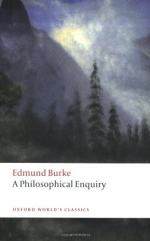
|
| Name: _________________________ | Period: ___________________ |
This test consists of 15 multiple choice questions and 5 short answer questions.
Multiple Choice Questions
1. What two main passions connect with this creative power of the mind?
(a) Pain and pleasure.
(b) Lust and desire.
(c) Love and hate.
(d) Curiosity and understanding.
2. What does Burke say is the primary passion ignited by the sublime?
(a) Anger.
(b) Confusion.
(c) Joy.
(d) Astonishment.
3. What smells or tastes are, according to Burke, the only smells or tastes capable of producing grand sensations?
(a) Sourness and tangy smells.
(b) Saltiness and flowery odors.
(c) Bitterness and terrible stenches.
(d) Sweetness and spicy odors.
4. Why is imitation important, according to Burke?
(a) It forms our manners and opinions.
(b) It facilitates comedy in the theater.
(c) It is how we try to get closer to God.
(d) It allows us to learn in school.
5. Which idea is more effective over the other in affecting the imagination, according to Burke?
(a) Shock value, rather than predictability.
(b) Obscurity, rather than clarity.
(c) Refinement, rather than coarseness.
(d) Originality, rather than imitation.
6. What is this creative power of the mind incapable of producing?
(a) Anything passionate.
(b) Anything truly new.
(c) Anything of great consequence.
(d) Anything captivating.
7. Burke asserts that vastness of dimension is as sublime as:
(a) Vivid, intense color.
(b) Regular, even sounds.
(c) Lightly textured surfaces.
(d) Minuteness of size.
8. What, according to Burke, is the first and most simple emotion of the human mind?
(a) Indifference, or lassitude.
(b) Hunger, or longing.
(c) Curiosity, or novelty.
(d) Fear, or terror.
9. What, according to Burke, is most striking to this creative power of mind?
(a) Arguments of fairness in disagreements among social unequals.
(b) The potential value of an object.
(c) Comparing resemblances between or imitations of two distinct objects.
(d) The quality of laughter in human communication.
10. What is Burke's argument for the existence of the passion of ambition?
(a) Ambition incites in people the drive to improve and excel so society will not stagnate.
(b) Ambition forces people to look within and question their inner selves.
(c) Ambition incites jealousy and envy, which drive people to become violent.
(d) Ambition is the manifestation of the natural hierarchy of low humans to high humans.
11. How does Burke define pain and pleasure?
(a) They are the only essential qualities about which people are concerned.
(b) They are figments of human imagination that help us explain our world.
(c) They are necessary to each other and cannot be separated.
(d) They are each of a positive nature, not dependent upon each other.
12. Which method of teaching does Burke think best?
(a) Referring obliquely to the subject in conversation with the learner.
(b) Lecturing the learner on the subject.
(c) Testing the learner on the subject.
(d) Allowing the learner to investigate the subject.
13. In what year was "A Philosophical Enquiry Into the Origin of Our Ideas of the Sublime and Beautiful" first published?
(a) 1757.
(b) 1801.
(c) 1794.
(d) 1773.
14. What does Burke assert is present in every religion, to some degree?
(a) A mode of forgiveness.
(b) A single deity.
(c) A salutary fear.
(d) A prophet.
15. What does Burke assert is necessary for the success of "A Philosophical Enquiry Into the Origin of Our Ideas of the Sublime and Beautiful"?
(a) To establish the principles of taste.
(b) To debunk all outmoded notions of the sublime.
(c) To demonstrate his expansive knowledge of the passions.
(d) To make his readers agree with him.
Short Answer Questions
1. Why does Burke offer a second edition of "A Philosophical Enquiry Into the Origin of Our Ideas of the Sublime and Beautiful"?
2. What, according to Burke, is responsible for common deviations in natural taste?
3. What passion does Burke identify as most effectively robing the mind of reasoning?
4. Into which two classes does Burke group the passions of society?
5. What is the main manifestation of infinity Burke mentions?
|
This section contains 691 words (approx. 3 pages at 300 words per page) |

|




